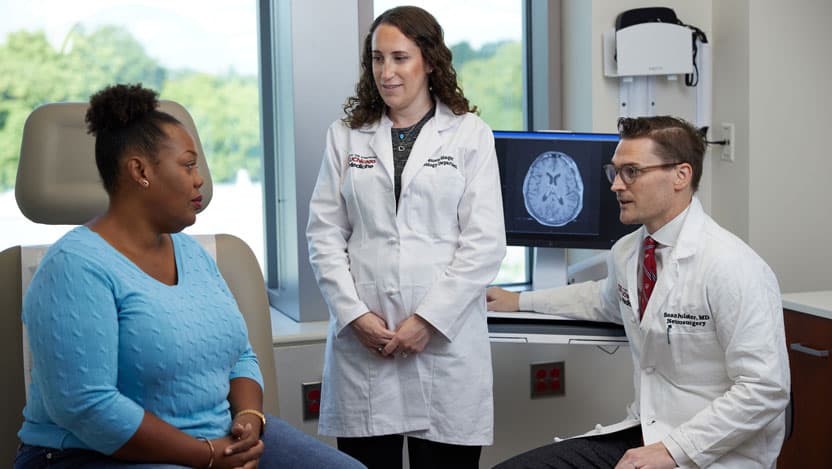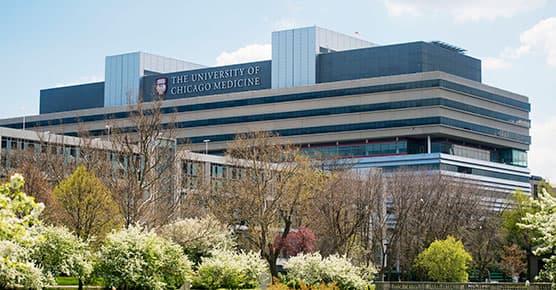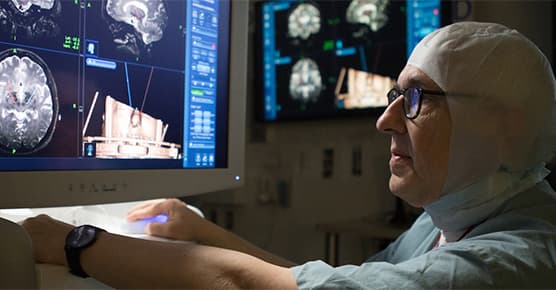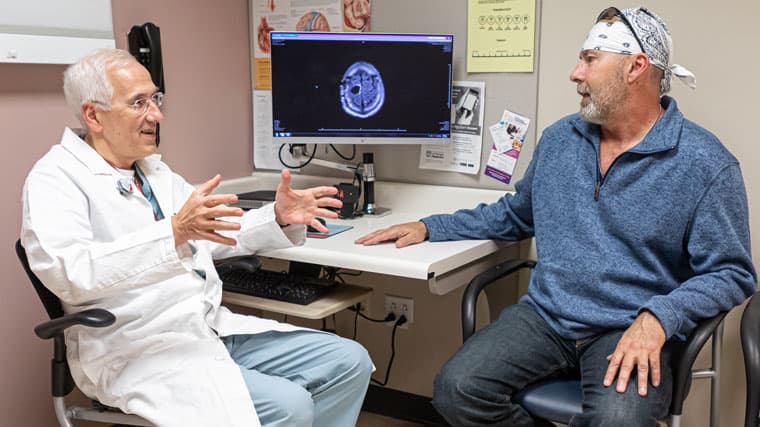Brain and Spine Tumors: Symptoms, Diagnosis and Treatment

If you have been diagnosed with a brain or spine tumor, don’t lose hope. Advanced tests and treatments have transformed care for brain and spinal tumors and cancers in recent years.
At the University of Chicago Medicine's Brain and Spine Tumor Center, we offer groundbreaking care for the full range of brain and spinal tumors, from slower-growing tumors to aggressive brain and spine cancers. Our brain and spine specialists have expertise in minimally invasive neurosurgery and other treatments that can help reduce your risk of complications and maintain your quality of life. We also specialize in treating metastatic brain and spinal cancers.
Our multidisciplinary team of neuro-oncologists, neurosurgeons, radiation oncologists and hematologist/oncologists will work together on a personalized care plan to help you achieve the best possible outcomes.
Brain and Spine Tumor Symptoms
Brain and spine tumors can cause a wide range of symptoms depending on where they are located. If you think you have recently been diagnosed with a brain or spinal tumor, our expert team at the University of Chicago Medicine Brain & Spine Tumor Center can help.
Signs of a brain tumor or brain cancer can include:
- Headaches that are often worse in the morning and do not improve with pain medicine
- Seizures, which may involve difficulty controlling your limbs
- Weakness or loss of coordination that affects your ability to walk
- Difficulty speaking
- Mood or personality changes, such as confusion or depression
- Memory problems
- Vision loss or double vision
- Extreme fatigue
- Dizziness
Signs of a spinal tumor or spine cancer can include:
- Back or neck pain that gets worse over time and doesn’t respond to pain medicines
- Pain that shoots down your arm or leg
- Muscle weakness, tingling or numbness in an arm or leg
- Difficulty walking
- Loss of bowel or bladder control
Brain and Spine Tumor Diagnosis
At the University of Chicago Medicine Brain and Spine Tumor Center, we use sophisticated imaging technology and pathology evaluation to determine the location, type and grade of your tumor.
Your neuro-oncologist or neurosurgeon is often the first physician you’ll meet from your multidisciplinary team. Your doctor may recommend some of these tests to help develop your personalized treatment plan:
Depending on your tumor, your doctor may take a sample of blood or cerebrospinal fluid (the fluid that surrounds your brain and spinal cord) to look for biomarkers that provide more detailed information on your tumor. Examining your tumor’s biomarkers can help our team design the most effective treatment plan possible.
Your team may use several imaging studies to better understand your tumor. Some common tests include:
- Computed tomography (CT) scans, which use X-rays to show the structures inside your skull
- Magnetic resonance imaging (MRI) studies, which show your brain and spinal anatomy more clearly than a CT scan
- Positron emission tomography (PET) scans, which use a radioactive injection to help doctors see tumor cells
Your doctor may decide you need to have a biopsy, a procedure in which a small sample of tumor tissue is taken to help determine the type of brain or spine tumor you have. Tumors can be assigned a grade from I to IV to explain how aggressive they are. This grading system helps physicians make the most accurate recommendations about how best to treat the tumor.
Types of biopsies your neurosurgeon may consider for brain tumor or spine tumor diagnosis include:
- Needle biopsies, which are often used on tumors in parts of the brain or spine that are hard to reach or critically important. For brain tumor biopsies, a special frame may be put on your head to hold it still. Your surgeon will use a thin needle guided by CT scan or an MRI scan to collect tumor cell samples.
- Open biopsies, which are performed through an opening in the skull or spinal bones. During this procedure, the scalp is cut and skull bone removed to access the brain, or a spinal laminectomy, or bone removal, is done to access the spinal cord. Often, an early diagnosis is made while you are still in the operating room. An open biopsy may also allow your doctor to remove as much of the tumor as possible.
Once we have a sample of your tumor, your neuropathologist will study its cells under a microscope to help determine the type of tumor it is. We will also perform a molecular analysis of your tumor, which can help us match the best possible treatments to your type of tumor. This careful research may sometimes take two to three weeks to complete.
When your brain tumor or spine tumor diagnosis is confirmed, our multidisciplinary team will discuss with you a customized treatment plan. This will depend on the grade and type of your brain or spine tumor.
Brain and Spine Tumor Treatment
The University of Chicago Medicine Brain and Spine Tumor Center offers the most advanced treatment options for patients with tumors of the brain and spinal cord. Our approach to brain and spine tumor treatment depends on factors such as:
- The type of tumor you have
- The size and location of your tumor
- How quickly the tumor may grow
- Your overall health, goals and personal preferences
Our team of neurosurgeons, neuro-oncologists, radiation oncologists, neuropathologists and other specialists will meet to discuss your case and suggest the most effective options to manage your tumor. These may include surgery, radiation, chemotherapy, targeted therapy and immunotherapy.
Surgery
Surgery is typically an important part of your brain and spine tumor treatment. UChicago Medicine neurosurgeons perform hundreds of brain and spine tumor operations every year. Our team uses high-precision surgical techniques and tools to operate on many tumors that were once considered inoperable. We offer:
Minimally invasive neurosurgery is associated with shorter recovery times and fewer complications than traditional surgery. For example, our surgeons may use endoscopic techniques, which involve operating through small incisions using thin tubes to preserve critical delicate tissues while providing better access to tumors.
EEA surgery allows surgeons to remove certain tumors through the nose without the need to open the skull (craniotomy).
Transorbital approach surgeryallows surgeons to remove certain brain tumors through the eye socket without the need to open the skull.
Skull base surgical techniques enable our neurosurgeons to operate on tumors located near the base of the skull with less risk to vital brain and brain-stem functions.
Neurosurgeons use high-powered microscopes and other tools for greater precision during surgery.
A minimally invasive, image-guided surgery that can destroy tumors while preserving surrounding brain tissue.
Tools which are used like “GPS for the brain,” allowing surgeons greater accuracy when removing abnormal tissue to help preserve healthy tissue.
Radiation Therapy
External-beam radiation therapy (EBRT) can be used alone or with other types of brain and spine tumor treatments like surgery or chemotherapy. Even when brain or spine cancer is removed through surgery, radiation therapy is often recommended to destroy any remaining cancer cells. For non-cancerous brain and spine tumors, radiation therapy may also be used to slow or halt growth or to treat recurring tumors.
At UChicago Medicine, you have access to sophisticated EBRT technologies, including:
Stereotactic radiosurgery (SRS) uses highly accurate positioning systems and 3D imaging to precisely map the location of your tumor and surrounding anatomy. Without any incisions, doctors can more accurately target a high-dose radiation beam on the tumor, so it is more likely to shrink or even disappear. Even very small lesions can be treated with SRS. Since SRS is very focused, the normal brain tissue around the tumor gets little or no radiation. SRS can be used for skull-base tumors, pituitary tumors and other growths that cannot be treated with surgery.
Intensity-modulated radiotherapy (IMRT) is a precise form of three-dimensional radiotherapy that uses computers and multiple beams to shape radiation to the treatment area. IMRT allows doctors to "turn up" the radiation dose on tumor areas while avoiding sensitive regions, such as the brain stem and spinal cord.
UChicago Medicine was one of the first hospitals to provide this advanced imaging and treatment technology, which can more precisely identify a tumor’s position. This helps ensure more accurate delivery of radiation to the tumor.
Whole brain radiation is used when there is more than one tumor in the brain or if cancer has spread throughout the brain.
Your brain’s hippocampus plays an important role in memory function, and minimizing radiation to this area can help reduce the side effects that radiation can have on memory and cognition. Hippocampal-sparing whole brain radiation may be used to reduce memory problems related to whole brain radiation treatment.
Chemotherapy
Chemotherapy is a type of treatment in which medication is delivered through your bloodstream to destroy and prevent the growth, spread or recurrence of cancer. If the type of brain tumor you have can be treated with chemotherapy, your UChicago Medicine doctor will analyze your tumor’s cells to determine whether a particular drug may be more effective, based on your tumor’s molecular material. New chemotherapies are also in development to treat brain and spinal tumors.
You may receive a single medicine or a combination, and this may be used alone or with surgery or radiation therapy. Although clinical trial research is expanding the use of chemotherapy in treating brain tumors, it’s still only effective on a limited number of them. Temozolomide is the most common drug used to fight brain tumors.
Chemotherapy is given in cycles; you may receive your therapy by infusion, by pill or through small wafers implanted in your brain.
Targeted Therapy
Targeted therapy uses medicine to either target cells that help brain and spine tumors grow. Targeted therapy can help when other treatments aren’t working. There are currently a few targeted therapies to treat brain tumors:
- Bevacizumab targets VEGF, a protein that normally helps tumors create the new blood vessels they need to keep growing. Blocking VEGF helps limit the size of the tumor. When added to chemotherapy, this medicine can help slow the growth of some types of tumors. It is often used for glioblastoma.
- MEK and BRAF inhibitors block certain proteins that play a role in cancer cell growth.
- Belzutifan blocks a protein called HIF-2a, which causes tumor growth in people with von Hippel-Lindau (VHL) disease.
- IDH inhibitors, such as vorasidenib, are approved for low-grade gliomas. These can be used in place of chemotherapy in certain patients.
Immunotherapy
Your immune system protects you from infection, illness and substances that can harm your body. Immunotherapy is an innovative medical treatment that harnesses the power of a patient’s own immune system against disease. Cancer immunotherapy acts on the cells of the immune system to seek out, recognize and attack cancer cells.
UChicago Medicine is a leader in advancing immunotherapies to treat a variety of brain and spine cancers. Learn more about clinical trials involving immunotherapy.
Why Choose UChicago Medicine for Your Brain or Spine Tumor Treatment?
Every year, hundreds of patients with brain and spine tumors seek their care at UChicago Medicine. Here are some reasons why:
At the Brain and Spine Tumor Center, our treatment strategies are guided by innovative research conducted at UChicago Medicine. Our scientists are helping build critical foundations for future advancements in brain and spinal tumor treatment.
Through our basic research program, UChicago Medicine scientists investigate the underlying mechanisms involved in how brain and spine tumors develop, survive and spread. Collaborative initiatives with the UChicago Medicine Comprehensive Cancer Center aim to substantially advance the treatment and prevention of brain and spinal cord metastases. This scientific research is supported by numerous grants, including a $90 million grant supporting the Ludwig Center for Metastases Research.
UChicago Medicine researchers are conducting clinical research focused on brain and spine tumors. Our Comprehensive Cancer Center offers access to the entire range of Phase I, II and III clinical trials supported by the National Institutes of Health (NIH) for newly diagnosed and progressive gliomas, as well as other types of brain and spine tumors.
In addition to national trials supported by the NIH, we also conduct industry- and investigator-sponsored clinical trials. These studies involve a range of treatments including surgery, radiation, chemotherapy, targeted drugs, immunotherapy and vaccines. Many of these treatments are not widely available at other hospitals. Your doctor can help you decide whether a clinical trial is right for you.
Our doctors are specialists in treating patients with limited metastatic cancer, including cancer that has spread to the brain and spine. Patients come to UChicago Medicine from around the world so they can receive innovative care for complex cases of metastatic cancer.
If you have metastases in your brain, our team can help guide you on the next step in your treatment. We also offer second opinions so you can have full confidence in your treatment plan.
Convenient Locations for Cancer Care
Request an Appointment for Cancer Care
We are currently experiencing a high volume of inquiries, leading to delayed response times. For faster assistance, please call 1-855-702-8222 to schedule your appointment.
If you have symptoms of an urgent nature, please call your doctor or go to the emergency room immediately.
To refer a patient for cancer care, please call UCM Physician Connect at 1-800-824-2282.
* Indicates required field

Cancer Care Second Opinions
Seeking the opinion of an expert in cancer care can ease your mind and help you feel more secure in choosing the right treatment plan for you.

Participate in a Clinical Trial
Our brain and nervous system cancer experts are actively conducting clinical trials of new and promising treatments.

Neurology & Neurosurgery
Expert Care for a Range of Nervous System Conditions
After Semitrailer Crash, a Trucker Receives Life-Changing Brain Tumor Diagnosis and 'Awake' Operation
After Donald Schwartz's semitrailer crashed, doctors performed brain surgery on him while he was awake to remove a cancerous tumor.

